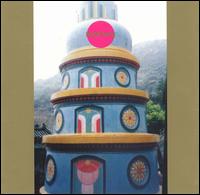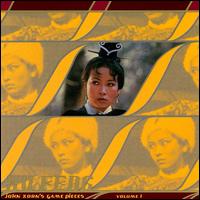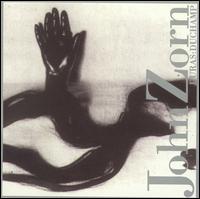
John Zorn is an American composer, conductor, saxophonist, arranger and producer who "deliberately resists category". His avant-garde and experimental approaches to composition and improvisation are inclusive of jazz, rock, hardcore, classical, contemporary, surf, metal, soundtrack, ambient, and world music. Rolling Stone noted that "[alt]hough Zorn has operated almost entirely outside the mainstream, he's gradually asserted himself as one of the most influential musicians of our time".

The Book of Heads (1978), composed by John Zorn, is a set of 35 etudes for solo guitar. It was recorded and released in 1995, and featured Marc Ribot. The pieces use multiple extended techniques.

Filmworks VII: Cynical Hysterie Hour is a 1989 album by John Zorn featuring music written for a series of Japanese animated shorts that were created by Kiriko Kubo. It features Zorn's first music for cartoons and was originally released on the Japanese Sony label in limited numbers. In late 1996 Zorn finally attained the rights for his music and remastered and re-released the album on his own label, Tzadik, in 1997.

Filmworks 1986–1990 features the first released film scores of John Zorn. The album was originally released on the Japanese labels Wave and Eva in 1990, on the Nonesuch Records label in 1992, and subsequently re-released on Zorn's own label, Tzadik Records, in 1997 after being out of print for several years.
"For Zorn, filmscores have always been a place to experiment, and the FilmWorks Series is in many ways a microcosm of his prodigious output. This original installment of the FilmWorks Series presents three scores ranging from punk-rockabilly ; a jazzy Bernard Herrmann fantasy; to a quirky classical/improv/world music amalgam for Raul Ruiz's bizarre film The Golden Boat. Zorn's infamous one-minute arrangement of Morricone's classic The Good, The Bad and The Ugly, is included as a bonus track. This is the place where it all began."

Taboo & Exile is an album by John Zorn. It is the second album to appear in Zorn's Music Romance Series following Music for Children (1998). Three of the tracks on this recording are from Zorn's Masada songbook.

Music for Children is the first release in John Zorn's Music Romance Series and features three Naked City compositions performed by Zorn with the band Prelapse; a 20-minute composition for wind machines and controlled feedback systems dedicated to Edgar Varese, and a classical chamber music piece for violin, percussion and piano performed by the Abel-Steinberg-Winant Trio framed by a poly-rhythmic etude for percussion and celeste and a lullaby for music box.

Archery is an album by John Zorn featuring his early "game piece" composition of the same name. The album was released by Parachute Records in 1982.

The Classic Guide to Strategy is a compilation album by John Zorn featuring his two early solo records The Classic Guide to Strategy Volume One (1983), (tracks 1-2) and the Classic Guide to Strategy Volume Two (1986), (tracks 3-8). The albums were first released on vinyl on Lumina Records in and later re-released on Tzadik Records in 1996 as a single CD. The second track is inspired by the work of Carl Stalling and tracks 3-8 are named after avant-garde Japanese artists. The Classic Guide to Strategy Volume Two also contained the track "Yano Akiko" (5:20) which does not appear on the CD re-release.

Godard/Spillane is a compilation album by American composer and saxophonist/multi-instrumentalist John Zorn consisting of music created through Zorn's file-card compositional process. The composition "Godard", a tribute to French film-maker Jean-Luc Godard whose jump-cut technique inspired Zorn's compositional approach, on the French tribute album Jean-Luc Godard|Godard ça vous chante? in 1986 issued by the French Nato label. "Spillane" was first released on Zorn's Nonesuch Records album Spillane in 1987, and "Blues Noël" was first released on the compilation album Joyeux Noël - Merry Christmas Everybody! on Nato in 1987.

Filmworks III: 1990–1995 features the scores for film and advertisements by John Zorn. The album was originally released on the Japanese labels Evva in 1995 and Toys Factory in 1996 and subsequently re-released on Zorn's own label, Tzadik Records, in 1997. It features the music that Zorn wrote and recorded for Thieves Quartet (1993), directed by Joe Chappelle, which was performed by the group that would become Masada; nine cues for Kiriko Kubo's Music For Tsunta (1988); eleven tracks for Hollywood Hotel (1994), directed by Mei-Juin Chen; and thirty-two pieces for advertisements by Wieden & Kennedy.

Filmworks IV: S/M + More features film scores by John Zorn. The album was released in Japan on Eva Records in 1996 and on Zorn's own label, Tzadik Records, in 1997. It features the music that Zorn wrote and recorded for Maria Beatty's The Elegant Spanking, Beatty and M.M. Serra's A Lot of Fun for the Evil One, "Credits Included" written for the film of the same name directed by Jalal Toufic and "Maogai," written for a piano scene in a film by Hiroki Ryuichi.

Filmworks VI: 1996 features three scores for film by John Zorn. The album was released on Zorn's own label, Tzadik Records, in 1996. It features the music that Zorn wrote and recorded for Anton, Mailman (1996), a short film directed by Dina Waxman that was never completed due to loss of funding in its final stages, Mechanics of the Brain (1996) directed by Henry Hills and The Black Glove (1996), which was directed by, and starred, Maria Beatty.

Masada Anniversary Edition Vol. 5: Masada Rock is the fifth and final album in a series of five releases celebrating the 10th anniversary of John Zorn's Masada songbook project. It features 10 Masada songs performed by Jon Madof's Rashanim trio with Shanir Ezra Blumenkranz on bass and Mathias Kunzli on drums in addition to Madof's guitar with guest appearances from Marc Ribot on two tracks. It was released in 2005 on Zorn's Tzadik Records as part of the Radical Jewish Culture Series.

Nani Nani is an album of improvised music by American composer and saxophonist/multi-instrumentalist John Zorn and Yamataka Eye. A sequel album Naninani II was released in 2004.

Xu Feng: John Zorn's Game Pieces Volume 1 is a studio album by American composer John Zorn consisting of game pieces. It features improvisations performed by an ensemble of pairs of musicians using the same instruments: Chris Brown and David Slusser on electronics; Fred Frith and John Schott on guitars; and Dave Lombardo and William Winant on drums and percussion. The album is titled after Xu Feng, a Taiwanese actress featured in many martial arts films who appears on the cover art, a still of Raining in the Mountain (1979).

Duras: Duchamp is an album of contemporary classical music by American composer and saxophonist/multi-instrumentalist John Zorn consisting two tribute compositions for Marguerite Duras and Marcel Duchamp.

Redbird is an album of contemporary classical music by American composer and saxophonist/multi-instrumentalist John Zorn consisting of two tribute compositions for artist Agnes Martin.

Cobra: John Zorn's Game Pieces Volume 2 is an album by John Zorn that includes his game piece, Cobra. The piece was recorded in previous versions by the labels HatHut, Knitting Factory, and Avant but this was the first time by Zorn's label Tzadik.

Filmtracks 2000 is the thirteenth album by American composer Bill Laswell, released on September 25, 2001 by Tzadik Records. Despite the title's suggestion, the album is not a collection of Laswell's film scores. Instead it is an assemblage of new compositions which contain the hallmarks of soundtrack music, drawing influences from the music of India, Asia and the Middle East.

7 NADEs is the debut album by violinist/multi-instrumentalist Eyvind Kang which was released in 1996 on John Zorn's Tzadik Records as part of the Composer Series.




















